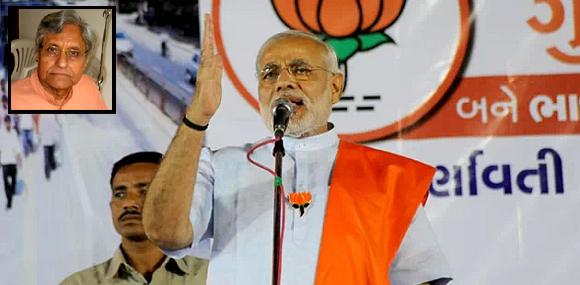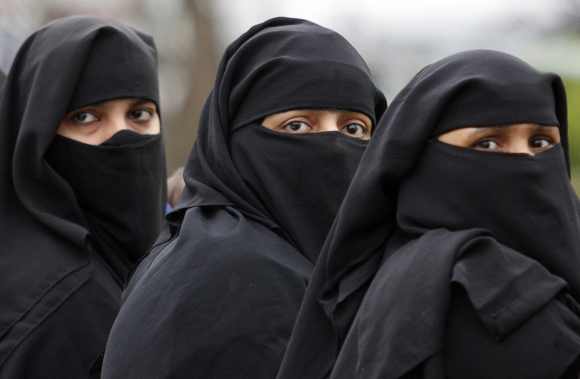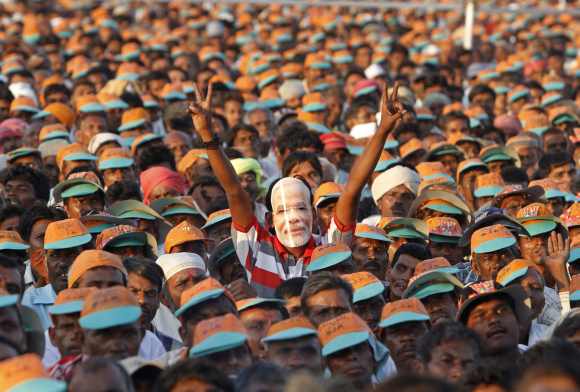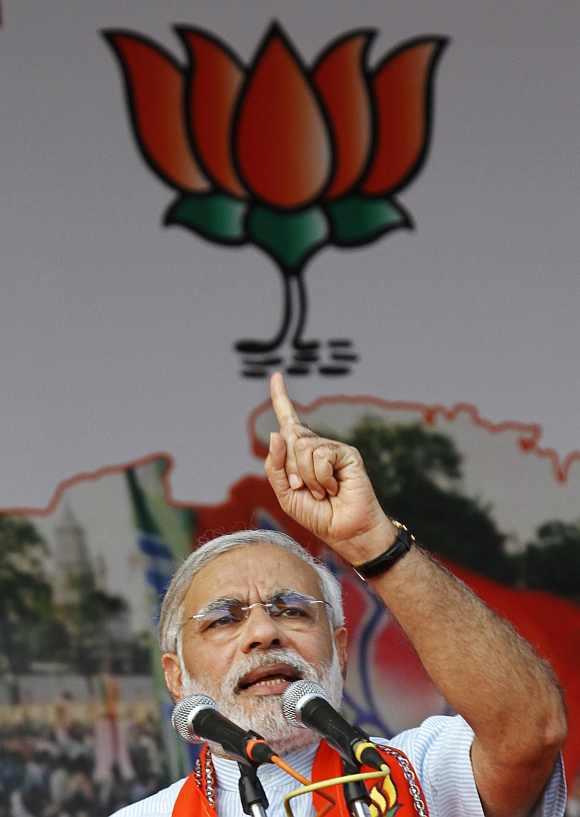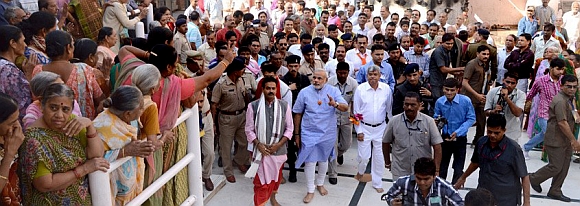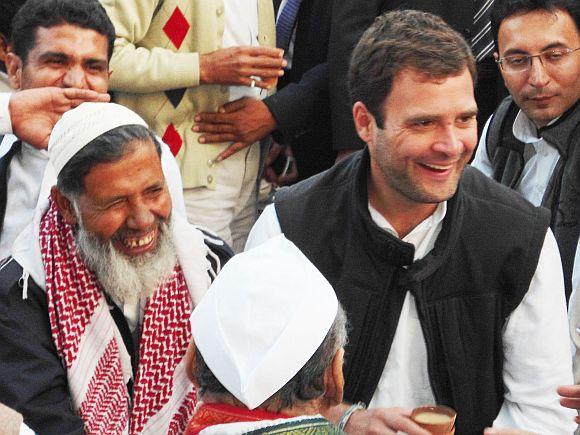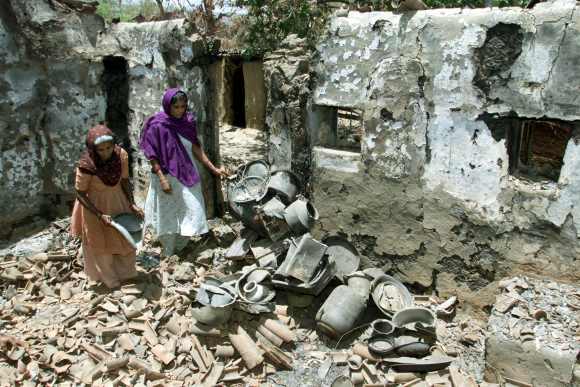 | « Back to article | Print this article |
'Narendra Modi is a politician not a saint'
Sheela Bhatt speaks to the popular Gujarati writer Gunvant Shah, who holds some strong and firm views on Narendra Modi.
Much before Narendra Modi became chief minister, Gujarati writers, hundreds of religious gurus, rich and powerful religious sects had turned against the Congress establishment. In the universities and colleges "anti-Congress" emotion was widespread. Saffronism has followed anti-Congress emotions.
Complete Coverage/Rediff forecastAmongst the popular writers Chandrakant Bakshi and Gunvant Shah were a craze amongst the young generation in the 1980s and 1990s. They wrote on Somnath and Mahmood Gazni, on regional deprivation and spoke of Gujarat's pride. The writers like them and religious sects have contributed majorly in shaping the mindset of Gujarat's last two generations.
Bakshi is no more but Shah is still, read and savoured by his widespread readers who include Modi. Shah has written many books, including his interpretations of Gita, and has been acclaimed for his weekly columns.
In interview with rediff.com's Sheela Bhatt he helps understand the psyche that supports Modi; that wants Modi to rule Gujarat and that wants to see him as prime minister of India.
ALSO READ:
'Gujarat's development is mainly roads, electricity, water'
'Gujarat will be one of the first places to implement FDI in retail'
Click NEXT to read further...
'Muslims of Gujarat are about to forget the cruelties of 2002'
Do you find major changes in Gujarat under Modi's leadership?
Yes. There are many changes. Change number one is that Muslims of Gujarat are going through a process of metamorphosis. This process of metamorphosis indicates that they are about to forget the cruelties of 2002.
The cruelties were perpetrated by Hindus. But then, in the previous event, in Godhra it was the doing of Muslims. But that does not justify the violence that followed. However, I won't call it ethnic cleansing or genocide but any incident like that does leave behind some uncomfortable facts and unpardonable memories.
There is a natural human tendency that with the passage of time events are conveniently forgotten. Now in a way this is a good sign and this is not true only for Muslims. This is true for any ethnicity, any race. The problem is this process of natural forgetting holds true for the 1984 riots also. It holds for the bitter memories of the Emergency also.
If you talk about the Congress and Emergency days and the undemocratic ways used by the Congress, people will not connect to it because of the passage of time. This is called healing. But there is healing at the social level also, socio-political level also. And it is this healing that has taken place in Gujarat. Muslims, may not, realise it, Hindus may not realise it. But the fact remains that the bitterness is diminished.
Now the other changes are at an economic level. As far as the agriculture growth is concerned it is claimed to be 11.3 per cent and this claim has not been questioned. Now no other state in India has this rate. I went to Odisha and saw how long it takes to go from Bhubaneswar to Konark. Why can't they make express highways?
But if you go outside Gujarat they say it is better to have a harmonious society rather than a bridge or a big road. It is more important that the entire society understands that there is no alternative to a value called fraternity.
Gujarat had a very long history of Hindu-Muslim riots. If you read reports of political scientist Ghanshyam Shah on the 1969 riots you will realise that those riots went on for six months. The number of persons who died was higher than 2002.
Shah's report says that the Congress was totally unmindful of healing the wounds. They passed a resolution that what can we do if Muslim behave this way? You are assuming that our society is not harmonious. Go to any village. I belong to Rander and 50 per cent of the population is Muslim. There is no problem and no suspicion. There is a high school, which is run by a Muslim trust. Hindu students go to that school.
Now there is a village called Valan near Miyagaon. A madrassa was started there after 2002. The trustee there is my friend. And he called me and asked me to suggest a good name for the madrassa. I gave an Urdu name and he said give a different kind of name. I gave the name Sarvodaya. And now when you visit the village, you can see the board -- Sarvodaya Madrassa. Can you imagine this? This was after 2002.
'Modi is a born leader, a born management person'
Don't you think in society there is a very subtle discrimination against the Muslims?
Subtle discrimination is there all throughout India. Gujarat is no exception. Go to some Mumbai housing societies and tell them that you are a Muslim and want a flat and they will say no. So many examples have been given by Javed Akhtar and Shabana Azmi. And they are not wrong. I consider Shabana, Akhtar and myself to be secular personalities.
I respect them because being Muslims and criticising the Shahi Imam requires guts. To be a Hindu and to talk against spiritual guru Asaram Bapu is difficult. Of course, I was threatened and it was Sachidanandan Swami who arranged some security without my knowledge to save my life.
Coming to Narendra Modi and since you know him and have met him, tell me how do you look at his leadership?
I consider him to be a born leader -- a born management person. A person born with a gift of speech. He has his finger on every small aspect. He can perceive things in its true perspective in order to manage them well. That's what I have realised after talking to him. One more thing, when I say good things about Modi, I have not the slightest inclination of getting even one iota of favour from him. I would never ask that.
Someone said (writer) Joseph Macwan wrote once in Naya Marg that Gunvant bhai wants to be a Rajya Sabha member. I told him over the telephone that this is not on my agenda.
How do you read Modi's mind? Do you know him enough?
I doubt. To know Modi is not so easy. And my connection with him is so rare. But as a social observer I admire certain capabilities that are inherent in him. Like good governance. What I admire in him is pranshakti (vital energy of life). Now pranshakti gets converted into will power. This is my understanding. You know anna brahma, prana brahma etc. Now prana brahma is the main thing which makes you dynamic.
'Modi attracts envy as if he is a magnet'
Why are so many people afraid of him? Not just minorities, even his party men.
I totally agree with you. I tell you one thing. I may not have as much pranshakti as Modi, but within my small circle I'm considered to be a person with pranshakti. Why? I was doing so many projects. Some of my colleagues were jealous of me. Now jealousy is a proof that you have pranshakti. Because one who goes out of the way, one who tries to over step, one who tries to prove something, one who tries to achieve something, and one who achieves it, is always a natural object of envy. Modi attracts envy as if he is a magnet. Sardar Patel used to attract criticism in his days.
I don't think anybody has been criticised in recent times as much as Modi. That proves something.
What is Modi's biggest strength?
His biggest strength is that he is clear in his perceptions so much that others are forced to keep watch on him. A philosopher once said 'Ek aadmi jab nikal padta hai, toh baaki ke log dekhte reh jaate hia', and they give way. So many time people felt about Modi, 'have gayo... have gayo' (His days are over.)
What is his weakness?
I think his weakness is his yearning for praise.
'Modi has certain weaknesses that Indira Gandhi had'
Clearly the image of Modi that has emerged is that of an autocrat. Do you agree?
I am telling all my Congress friends that Modi has certain weaknesses that Indira Gandhi had, and they all agree. Do you know that people have got one weakness -- they admire a person, no matter how autocratic he is, one with firm decisions, one with the ability to enforce a decision with vital energy.
Indira Gandhi is praised even today because of her unflinching decision-making policy. Decision-making and then implementation of that decision -- one who is undemocratic, will be pardoned in India.
You are talking of decision-making. Look at his decisions to appoint vice chancellors like Parimal Trivedi, Shashiranjan Yadav. Where is the decision making?
You know as a strong man, he requires weak followers. These vice chancellors are almost like Bharatiya Janata Party workers.
Why is Modi so insecure to appoint such useless people for such a tough job?
If the vice chancellor is competent enough to say to Modi that, "No sir I cannot have a rally for you. This is my university." Do you think such a vice chancellor would be tolerated by Modi? It is not a weakness of Modi. Why did Sonia Gandhi select Pratibha Patil as President? Same logic runs for this.
But the person is strong only when he upholds fundamental values.
We are not discussing strange things. He is a politician. He's not a saint. He is not Jayprakash Narayan. He is not Acharya Kriplani. He is a politician. He's not even Sardar Patel. Or Morarji Desai. He has yet to prove that he is a statesman. Greatness has to be proved.
Modi has yet to prove that he is great. A great man has to give away something. In Indian civilisation, without tyaag, (sacrifice) you can never be great. Indian people would salaam you as if you are a badshah...
'Modi is a master of manipulative politics'
But what do you think about the field of education?
I would rate him at the poorest level because of this. Even within the BJP supporters, there could have been better vice chancellors than what have been chosen. You know my whole life has gone in post-graduate education and in universities.
Where will all these kinds of decisions lead to?
I'll tell you one thing. In Gujarat higher education has gone to the dogs. And I have written this in my columns against Modi. But, even the Congress has lost its ideology. The BJP has lost its ideology. And today, manipulative politics is politics. If Modi is a master of manipulation, I wouldn't disagree with you. He is a master of manipulative politics and political decision-making.
Even if you are there at the helm of affairs you will have to have some 25 people who will stand up when you say stand up and they should sit down when you say sit down. Ram Manohar Lohiya had said a good leader has some blind followers. Sardar Patel, Jawharlal Nehru and Mahatma Gandhi, all had blind followers.
'In Delhi, it is a fashion to criticise Modi'
In Modi's ten-year rule, poets of Gujarat, short story writers, novelists are not reflecting the reality in words? There is an increasing gap between society and literature.
The Gujarati Sahitya Parishad has published a big volume, which has all the articles and stories of prominent literary personalities of Gujarat writing about this after 2002. I have also contributed an article. I went to north Gujarat where there was strife.
What is your take on the current election in Gujarat?
I think the BJP will win the election. This is my objective assessment because the manipulative skills are very influential in elections. Once upon a time Jinabhai Darji had this skill. Immediately after 2002 riots I visited Vyara and Jinabhai was there also. As soon as the meeting was over I chatted with Jinabhai. He said 'Gunwantbhai. Modi maate je pan loko kahe, pan saalo corrupt nathi.' (Whatever people may say about Modi but he is not corrupt). Exact words. Now Sheela, to be non-corrupt, and to be labeled non-corrupt by his highest and strongest enemy is not an easy thing.
Then I went to Umta, a village near Mehsana. Fifty eight houses were burnt during the riots. Two-three Hindu agencies they took up the project to renovate and replenish the buildings. (Former Punjab Police chief) K P S Gill told me here Modi didn't do anything intentionally.
'2002 riots were a blot on Gujarat'
How do you see Gujarati society today? There is a fast-track privatisation.
Development requires a price. Even the Narmada project had a price. Medha Patkar was not a fool. She was in her senses when she said development at what cost? Even Arundhati Roy said if the Narmada project is stopped, it can be a permanent museum for environmental protection. Do you think the price paid for this project is less in terms of human misery? The uprooting the people from their habitation and transplanting them somewhere else without their animal assets... is that not a high price for capitalism?
Doesn't it disturb you? Do people support Modi's policies?
Those who are really affected will not say yes. But those who are not actually affected would not realise what that impact means.
How do you see the national media's attitude to Modi?
Outside Gujarat, in Delhi, it is a fashion to criticise Modi. If there is a seminar in Delhi, unless you mention Modi once or twice, your speech does not get reinforced.
Do you think Modi has the capacity to lead the country?
I have full faith that Modi will be able to lead the country in a better way. Because he has firm ideas about what is to be done immediately and what should be done for the future. If Modi can become PM even for two years, and I cannot give him more than that, he would initiate certain steps which would make India proud!
But if Muslims feel insecure... how will they live in the country?
See you want to bring Muslims everywhere. There are other minorities also. And within Muslims, Shia Muslims are not against Modi as you think.
But there are a large number of secular people who feel he that he has not apologised for the 2002 riots and he has not...
It was a shocking incident. A kalank (blot) on Gujarat. Why should he apologise if he has not done something wrong? A person is innocent till proven guilty.
So you think he should not apologise.
Not at all! You are talking nonsense. When there is rioting and provocation of this dimension, do you think there won't be any reaction from the majority community? You conveniently forget that in 1984, Sikhs were killed by Hindu Congressmen. Not a single non-Sikh was killed. You can call it a pogrom. Here in Modi's Gujarat, 218 Hindus were killed in police firing... And do you know even Congressmen came to fight Muslims on that day?
TOP photo features of the week
Click on MORE to see another set of PHOTO features...
